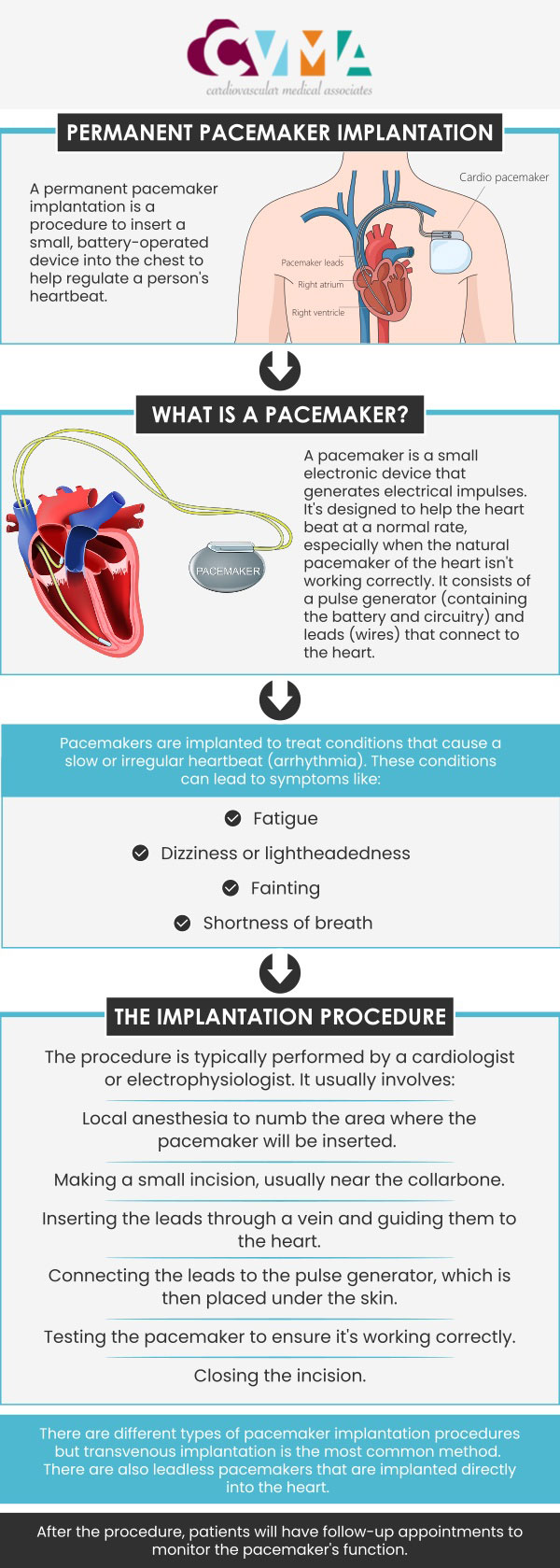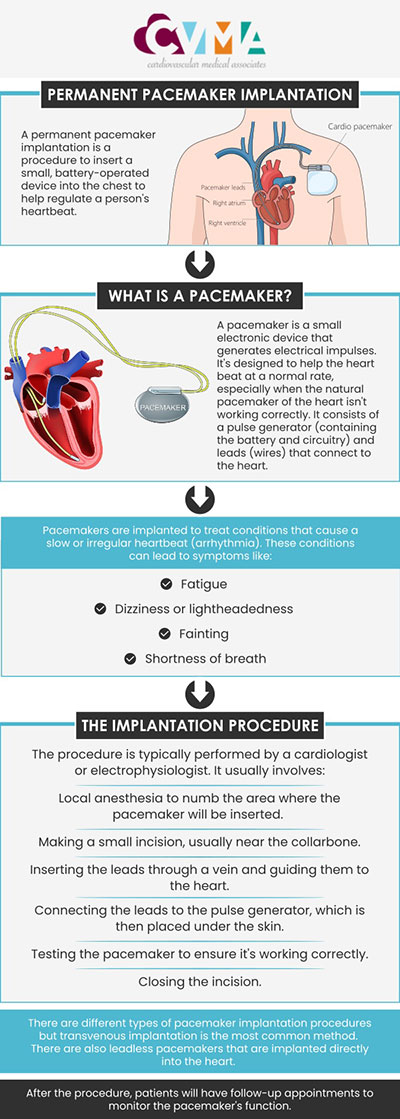Permanent Pacemaker Implantation in Downey, CA
Permanent pacemaker implantation is a procedure that helps regulate abnormal heart rhythms by delivering electrical impulses. The device is typically implanted under the skin near the chest and connected to the heart. This treatment improves heart function and quality of life for those with certain heart conditions. Our board-certified cardiologists, Kaushal Tamboli, MD FACC, Paiboon Mahaisavariya, MD FACC, and Paul Yoshino, MD, at Cardiovascular Medical Associates provide safe and effective care for pacemaker implantation. For more information or to schedule an appointment, contact us today or book online. We are conveniently located at 8317 Davis St, Downey, CA 90241.




Table of Contents:
What is pacemaker implantation?
How long does a permanent pacemaker last?
How often should a pacemaker be replaced?
Can you live a long, normal life with a pacemaker?
At Cardiovascular Medical Associates, we specialize in diagnosing and treating a variety of heart conditions, including heart rhythm disorders. One of the advanced treatments we offer is the implantation of pacemakers. This battery-operated device is surgically implanted, typically in the chest just beneath the collarbone, to regulate the heart rhythm and manage arrhythmias such as bradycardia.
Our experienced team of healthcare professionals utilizes pacemakers to treat patients with heart conditions such as:
● Bradycardia: A slow heart rate that impedes the heart’s ability to pump blood.
● Tachycardia: A fast heart rate that can lead to heart failure or sudden cardiac arrest.
● Heart block: An electrical issue that prevents the heart’s electrical signals from passing from the upper to lower chambers, causing a slow or irregular heartbeat.
The process of pacemaker implantation generally lasts between one to two hours and is done using local anesthesia. Our team ensures that the pacemaker is appropriately positioned, connected, and programmed to deliver electrical impulses based on the patient’s specific needs. After implantation, the device continuously monitors the heart’s electrical signals and intervenes when it detects any irregularities, prompting the heart to maintain a normal rhythm.
After the implantation, we provide comprehensive post-operative care, which includes educating patients about the necessary precautions and scheduling regular follow-up appointments for monitoring, adjustments, and battery replacement as needed. We make sure that every patient is carefully monitored to ensure the pacemaker is functioning properly and that there are no complications after the procedure.
Permanent pacemakers are implanted medical devices that regulate the heart’s rate and rhythm. The battery, which is a crucial component determining its longevity, generally lasts between 6 and 15 years. However, the lifespan can vary considerably due to several influencing factors such as device type, battery type, patient’s condition and usage, and lifestyle factors.
For instance, single-chamber pacemakers, which pace only one chamber of the heart, typically have a longer lifespan than dual-chamber pacemakers, which pace both chambers. In terms of batteries, pacemakers use either lithium-ion or zinc-air batteries. Lithium-ion batteries generally have a longer lifespan than zinc-air batteries.
The more a pacemaker is used, the faster its battery will drain. Factors that can increase pacemaker usage include exercise, medications, and heart conditions that require more intensive pacing. The patient’s overall health condition also plays a vital role.
Although the device itself can last for many years, our team emphasizes the importance of regular monitoring to ensure its proper functioning. Follow-up appointments with our healthcare providers are vital to assess the battery status and overall performance of the pacemaker.
Once the battery life approaches its end, a procedure known as a pacemaker replacement, or a generator change will be required. This involves replacing the pacemaker generator, which houses the battery. Our experienced cardiologists are well-equipped to perform this procedure safely and effectively.
The type of pacemaker and its usage can significantly affect its lifespan. For example, single-chamber pacemakers tend to last between 5-7 years, while dual-chamber or biventricular pacemakers can last 7-12 years. The battery is the primary determinant of when the device needs to be replaced, and the more frequently the pacemaker is used to regulate your heart’s rhythm, the faster the battery will deplete.
Our team at Cardiovascular Medical Associates is well-equipped to monitor other factors that can influence the lifespan of your pacemaker. Conditions like infections, electrolyte imbalances, or metabolic disorders can potentially accelerate battery depletion.
We emphasize the importance of regular check-ups in monitoring your pacemaker’s battery life and overall functionality. During these visits, we will recommend a replacement when the battery reaches a certain level or if there are any indications of device malfunction, infection, or changes in your heart rhythm or cardiac status.
When a replacement is needed, only the pacemaker’s generator and battery are replaced, not the entire device. This procedure is usually done under local anesthesia and takes a few hours, and most patients can go home the same day and resume normal activities soon after.
Post-replacement, we will closely monitor you to ensure that the new pacemaker is functioning correctly and provide any necessary activity restrictions to allow for healing and prevent complications. Regular check-ups and continuous communication with our healthcare professionals will ensure that your pacemaker is functioning optimally and replaced on time when needed.
Our team is skilled in the latest pacemaker technology, which has advanced significantly over the years. The devices we utilize are highly reliable, typically lasting between 5 to 10 years before replacement is necessary. After getting a pacemaker, you can typically resume most of your regular activities within a few days. Although we recommend avoiding vigorous upper body activities for about a month post-implantation.
At Cardiovascular Medical Associates, we provide ongoing care to ensure your pacemaker is always functioning optimally. This includes regular check-ups to monitor battery life and adjust settings as required. We’ll also guide you on the necessary precautions and lifestyle adjustments to ensure your safety, such as avoiding strong magnetic fields, handling high-voltage equipment carefully, and informing medical and security personnel about your device when necessary.
We encourage our patients with pacemakers to lead active lives, participating in most physical activities without limitations. However, we recommend starting gradually and always listening to your body. Certain strenuous activities may need to be modified for safety.
Contrary to some misconceptions, having a pacemaker does not shorten your lifespan. On the contrary, by controlling abnormal heart rhythms, a pacemaker can help extend your life.
At Cardiovascular Medical Associates, we’re dedicated to improving the quality of life for our patients with arrhythmias. Our care and the latest pacemaker technology allow our patients to live long, normal lives. Always remember to consult with our team for advice best suited to your medical condition. For more information or to schedule an appointment, contact us today or book online. We are conveniently located at 8317 Davis St, Downey, CA 90241. We also serve patients from Norwalk CA, Lynwood CA, Lakewood CA, Cerritos CA, Whittier CA, and surrounding areas.






